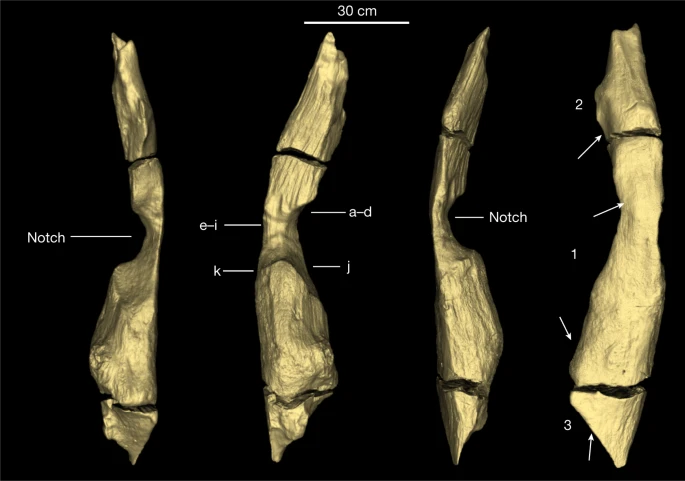The paper "Evidence for the earliest structural use of wood at least 476,000 years ago" was published in Sep 2023 in Nature, one of the most prestiguous peer-reviewed scientific journals.
The paper presents archaeological findings establishing the use of wood in structures nearly half a million years ago, predating the evolution of homo sapiens.
The abstract begins:
Wood artefacts rarely survive from the Early Stone Age since they require exceptional conditions for preservation; consequently, we have limited information about when and how hominins used this basic raw material. We report here on the earliest evidence for structural use of wood in the archaeological record. Waterlogged deposits at the archaeological site of Kalambo Falls, Zambia, dated by luminescence to at least 476 ± 23 kyr ago (ka), preserved two interlocking logs joined transversely by an intentionally cut notch.
And here is an image of the notched piece of wood

A Nature news article provides some context:
Some 500,000 years ago in central Africa, ancient human relatives chopped down trees and transformed the wood into digging tools, wedges and what might just be the world’s earliest-known wooden structure.
Now, remnants of this ancient woodworking have been found at an archaeological site in Zambia called Kalambo Falls. Researchers can’t definitively identify the possible structure, which might have been a raised platform, a shelter or something else entirely. Whatever it was, it pre-dates the evolution of Homo sapiens by more than 100,000 years, hinting that hominins that lived long before our own species were already working wood.
Will the paper be retracted before 2025? This market resolves YES if a statement from Nature or indication on Nature's website, dated before 2025, establishes that the paper has been retracted.
🏅 Top traders
| # | Trader | Total profit |
|---|---|---|
| 1 | Ṁ38 | |
| 2 | Ṁ22 | |
| 3 | Ṁ20 | |
| 4 | Ṁ17 | |
| 5 | Ṁ17 |
Most wrong papers just aren't retracted. I'm think that remains true of Nature, but you never know
I don't see any specific claims of falsity or misconduct on Twitter. There are general murmurs that flashy stuff published in nature is likely to be wrong but that's expected.
But I think most papers in that category don't get retracted. Did you have any other reason to think this might be retracted?
@jacksonpolack It's just a pretty incredible finding, and I wanted make a market on whether it will pan out. Retraction isn't a great proxy for it being wrong, as you say, but "Will it replicate" is unfortunately not great either.
Like, if we find more wooden structures that old it would help confirm the conclusion that hominins were building structures out of wood way back. But I wouldn't expect that evidence to emerge any time soon, making it not so suitable for a "will it replicate" type Manifold market.
But if it turns out the dating procedure is wrong or something like that, well that could lead to a retraction. It also might not - perhaps a different market about whether other peer-reviewed papers will plausibly challenge the dating would be better.
Open to suggestions.